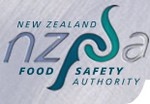CE's column: Allergies - taking responsibility for the food we serve
Today’s thinking around food safety very much focuses on operator responsibility and the notion that supplying or serving safe food is good for business. You could say it’s more about the carrot, rather than the stick
So what happens when something tragic occurs, like the death in 2007 of a customer at an Auckland restaurant who suffered a severe allergic reaction to a meal?
We have to look at this in the context of a change in the approach to food safety. NZFSA is at the fore of a global shift away from the ‘doors, floors and walls’ regulatory approach where food outlets are inspected for compliance with arcane, prescriptive rules around bench height or distance to hand basins, and so on.
We’re now looking to food business operators to understand the potential risks and to make sure that all their staff not only know what to do, but put that knowledge into action to avoid risks, or to deal with them appropriately when things do go wrong.
Sadly, even with a proper understanding of the risks, without constant vigilance these tragedies can happen.
The Coroner has just released his findings on the death of the allergy sufferer in question.
This distressing event is a salutary reminder of the need for all restaurant staff and food business operators to take extreme care in the preparation of meals for people with allergies. In the case in point, the person who organised the dinner and the diner himself had told restaurant staff of his allergies to eggs, nuts, fish and chicken. The restaurant recorded this, and said they could cater for him. The rest of the party ate oysters but, shortly after being served an alternative entrée the victim collapsed. He later died in hospital.
In his report, the Coroner noted that the victim’s employer – the host for the dinner – “did all that could be expected to alert the restaurant to his allergies”. Further, the victim proactively managed his allergy by taking care with what he ate. In this instance, he took all the right steps to advise the restaurant and check the menu. The Coroner also noted the restaurant “took many steps in an attempt to avoid the risk of the deceased being exposed to foods to which he was allergic”.
Despite all this, something went terribly wrong. There may be many possible scenarios. The Coroner was not able to determine how the allergen – “likely a trace of either nut or oyster” – got into or onto the victim’s entrée.
The Coroner recommended that NZFSA review the information provided to food service outlets and consumers about food allergies. After the death, NZFSA did not wait for the Coroners report to start reviewing our approach to allergens. Food allergies have been, and will remain, a priority area for NZFSA.
Food allergy is a reaction to a protein that is usually immediate – from a few seconds to a few hours after food is eaten. The most common food allergens responsible for up to 90% of all allergic reactions to foods are the proteins in cow’s milk, eggs, peanuts, wheat, soy, fish, shellfish and tree nuts. Reactions can range from hives, swelling of the face and throat which affects breathing, nausea, vomiting, stomach pain, through to collapse and even death. Even the smallest traces transferred by knives, cutting boards, plates, benches, hands or even aprons or towels can cause a reaction in many allergy sufferers, and this kind of cross-contamination is one of the biggest risks for these people.
We work closely with Allergy New Zealand, food manufacturers and suppliers through groups like the New Zealand Food and Grocery Council, and the Food Industry Allergen Forum to provide consistent, science-based information and to fund research and resources.
Allergy New Zealand estimates food allergies affect about 160,000 New Zealanders – 2-4% or the adult population and 6-8% of children. Food allergies can be life threatening, and cannot be taken lightly by anyone supplying or serving food.
In 2006, NZFSA set up a working group of experts in science, nutrition, food regulation, labelling and production processes to provide an in-house resource for dealing with allergen issues.
NZFSA has developed an off-the -peg food control plan (FCP) to help food business operators to identify potential risks, and provide a systematic way of managing them. The FCP contains pages devoted to allergy management, and were included in the Coroner’s report, along with material published by Allergy New Zealand in consultation with NZFSA. We have also published guidelines to help food service businesses tailor allergen management in the food control plan to their specific operation.
Food businesses have a responsibility under the Food Standards Code to list certain allergens in the ingredients list on labels of pre-packaged foods. To help food manufacturers and suppliers navigate the requirements of the Food Code, we developed an information sheet on allergen warning and advisory statements. In cafes, restaurants and takeaways, where the food is generally not packaged, staff must provide ingredient information to consumers on request.
NZFSA’s booklet Eating safely when you have food allergies gives information to help consumers manage their food allergy. Call our information line 0800 693 721 for a free copy or download it from our website www.nzfsa.govt.nz
But the message for all of us is clear. Food allergies are not to be taken lightly. Information, awareness and staff training are vital, but just knowing what to do is not enough – everyone has a role in keeping food allergy sufferers safe. NZFSA will continue to provide the most up-to-date science-based information to consumers and industry, and to work closely with Allergy New Zealand and food businesses to do all it can to prevent similar tragedies in the future.
